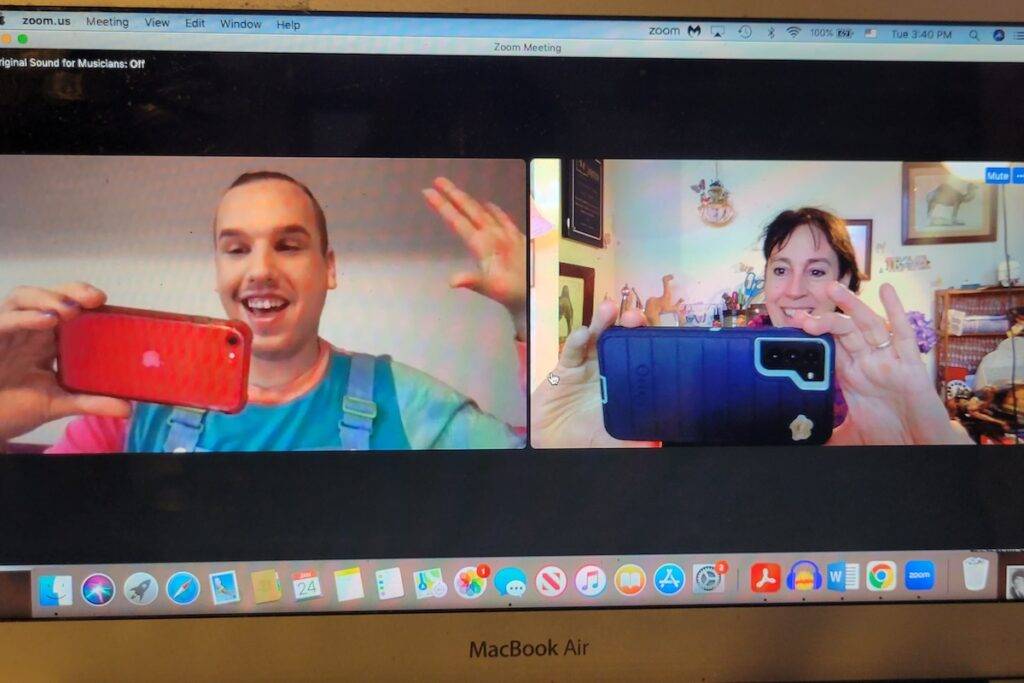I distinctly recall my earliest “narrator crisis.” It played out over a couple months, more deeply branding itself into my psyche, and there was no one to help me. Too many outside factors caused me to lose sight of my true north and the faith in what I knew as trained, experienced actor. That is until I met my first Audiobook mentor, a person with decades of experience, including high-profile projects.
He took me under his wing and I discovered how to be a better voice actor. He helped me grow into my roles and the role of the narrator. He listened to my chapters and gave feedback. Truthfully, what he taught me was how to trust the text, my training, and myself (and of course mic techniques, editing , and other best practices ). I have learned and continue to learn from so many wonderful people, but this person’s brilliance, insight, and kindness changed my life.
Because my mentors have impacted me more deeply than I think even they will ever really know, I mentor others, especially in navigating what can sometimes feel like a landmine-ridden terrain. Recently, I’ve taken on quite a few of these opportunities to support both audiobook narrators and teaching artists. In fact, one of the programs I’m working with just launched again for this year, the New York State Teaching Artist Mentorship Program. As I think back on my work with them (and look forward to partnering again), I also rediscover the importance of mentorship.

Why mentorship matters
Even the best actor or the best employee will struggle to break into this world of storytelling (not to mention get consistent work). You need to learn so many things to succeed. It’s not enough to have mastered stage and screen, becoming a voice actor involves a new approach to characters and narration. And that’s not the whole picture. A huge part of having a mentor is learning the other things: how to find work, stick with deadlines, project manage yourself, and be your own marketer. When I take on a mentee, I really check in, asking them what they’d like to know, not just about the fundamentals of the job, but the other aspects, too.
There’s one other thing that matters — women and people of color have historically been held out of some of the bigger roles in VO. By focusing on boosting up under-represented voices, we all benefit from getting the best narrator for the job.
What I focus on as a mentor
As mentioned, I put my mentorships skills into two buckets: the performance aspects and (for lack of a better term) the administrative ones. I’ll talk about both here.
Performance
Some of my mentees have not had a performing background at all, so in those cases I’m accessing my experience as a teaching artist and director. But usually, I think about how to translate one type of performance into another. In the case of narrating an audiobook, that means focusing a lot of our time on character (including the narrator), the storytelling style and arc, and even diving into the more technical aspects of creating a voice.
On one occasion, I worked with a circus performer who was becoming a teaching artist. The main project there was translating their background into arts education, by drawing on the interactive nature of their performances to create a highly inclusive artist residency at an elementary school.
Administrative aka Project Management
There’s a lot that goes on behind the scenes as a narrator. Learning to prep the text by taking the right notes is essential for making the most of your time in the booth. In addition, no two people will make notes exactly the same. Recently, my mentee was trying various ways of tracking their notes and kept getting stuck. I walked them through my own process and they ended up using something similar to what I do. Because they have a similar neourdivergency to me, we were able to come at this from a shared place and learn from each other. Everyone also has to discover a system of project organization and workflow, especially when it comes to divvying up hours in the day.
How to join a mentorship program
In my case, I was selected to become a mentor for the New York State Council on the Arts and then also the Audio Publishers Association. When filling out my application, I thought about what I offer uniquely to the role and tried to give a good representation of my own strengths and passions. After submitting, the coordinating organization will most likely match you with someone who fits appropriately.
Each mentorship is different and has different goals. As in any relationship, communication is key. You should touch base in advance of each session so that you can prepare for that particular meeting while also reflecting/returning to the arc of learning as a whole.
What I have learned about mentorship
It’s such a cliche, but I feel like I have gained so much more than I have given from this experience. It’s been an amazing success because I have learned and grown so much, while also being touched by the experience of helping to bring a capital A Artist into the world!
People should never be afraid to reach out to someone that they want to mentor them and there are way more mentorship programs sponsored by large orgs than you would realize. Joining one of these programs can be an incredible first step in boosting your skills and growing as an artist.